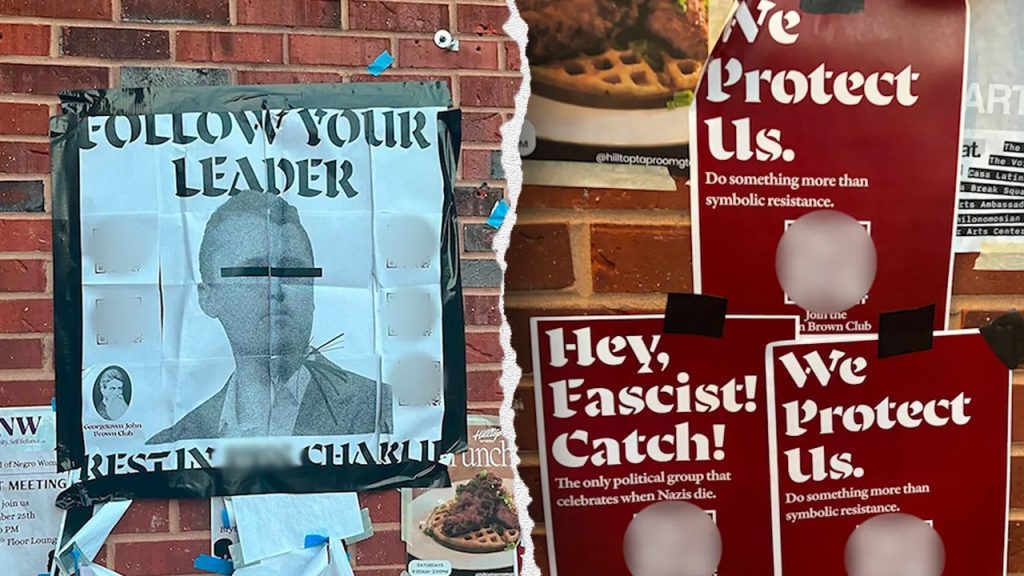Georgetown University Responds to Threatening Posters Targeting Conservative Activist
Georgetown University has taken swift action to remove inflammatory posters celebrating the assassination of conservative activist Charlie Kirk, reporting the incident to the FBI as the situation escalates on campus. The disturbing flyers, discovered Thursday night in Georgetown’s main free speech zone known as Red Square, featured Kirk’s face with his eyes blacked out alongside menacing phrases like “Follow your leader” and “Rest in p-ss Charlie.” These posters followed an earlier wave removed Wednesday that bore the slogan “Hey fascist! Catch!” – the same phrase reportedly used by Kirk’s alleged assassin, Tyler Robinson, during the September 10 attack at Utah Valley University. The university has categorically condemned these displays, stating, “Georgetown University has no tolerance for calls for violence or threats to the university,” as they continue to work with law enforcement to investigate the incident and ensure campus safety.
The posters have created a chilling effect on free expression at Georgetown, particularly among conservative students who now question their safety when organizing campus events. Shae McInnis, treasurer of the Georgetown College Republicans, expressed profound concern about the escalating nature of the threats, noting that Thursday’s posters were more numerous and prominently displayed than Wednesday’s. “Just even more shocked than I was [Wednesday]… it really makes me feel like our entire university is under attack by people with no decency and no respect for our society,” McInnis told Fox News Digital. Despite the intimidation, he affirmed that conservative students refuse to be silenced: “They’re trying to shut us up, but we’re not going to. We’re going to be bolder, be louder and proclaim our message with confidence.” This determination comes amid growing apprehension about whether it’s even safe to host conservative events on campus at all.
Both sets of flyers carried references to the “Georgetown John Brown Club,” a group associated with leftist activism that has been linked to concerning incidents elsewhere. The John Brown Gun Club, referenced in the QR codes on the posters, has been classified as a far-left group by the Center for Counter Extremism and has connections to violent incidents, including an armed attack on an ICE detention center in Texas in 2025 and an attempted firebombing of an ICE facility in Tacoma, Washington, in 2019. This association has heightened concerns about potential violence on campus, with McInnis questioning, “How can people be safe to express themselves freely if they know their classmates could be wanting to kill them, literally kill them for expressing their own ideas?” The situation underscores the increasingly tense political climate on American university campuses.
The incident has drawn attention from federal officials, with U.S. Education Secretary Linda McMahon condemning the flyers on Wednesday and stating that violent rhetoric on campus “must be condemned by institutional leaders.” Georgetown’s response has included not only removing the offensive materials but also engaging their “team of safety and security experts, including its police department and specialized threat assessment professionals” to investigate the matter thoroughly. The university’s decision to involve the FBI signals the seriousness with which they’re treating these threats, recognizing that such inflammatory content goes beyond protected speech and ventures into potentially criminal territory that endangers the campus community.
For conservative students at Georgetown, the appearance of these posters represents more than just offensive speech – it symbolizes a direct threat to their physical safety and their right to participate in campus discourse. McInnis has called for decisive action, urging the university to “identify every student involved, and they must be immediately expelled.” His appeal extends beyond campus administration to federal authorities: “If the university is not willing to do that, I would urge the federal government to please help. Please protect conservative students at Georgetown and across every campus in our country.” This plea reflects growing concerns about political violence and intimidation on college campuses nationwide, where debates about free speech boundaries continue to evolve in increasingly polarized times.
The Georgetown incident comes amid broader national conversations about political violence following Kirk’s assassination, with universities across the country grappling with how to respond to expressions celebrating or defending his death. Some institutions have taken action against employees for social media posts about the killing, highlighting the complex balance between free expression and maintaining safe, respectful campus environments. As Georgetown works with law enforcement to investigate these threatening posters, the university community finds itself at the center of this national dialogue about political discourse, violence, and the limits of free speech in academic settings. The outcome of this investigation may set important precedents for how universities respond to similar incidents in the future, particularly as the nation approaches a contentious election season where political tensions are likely to remain high.















